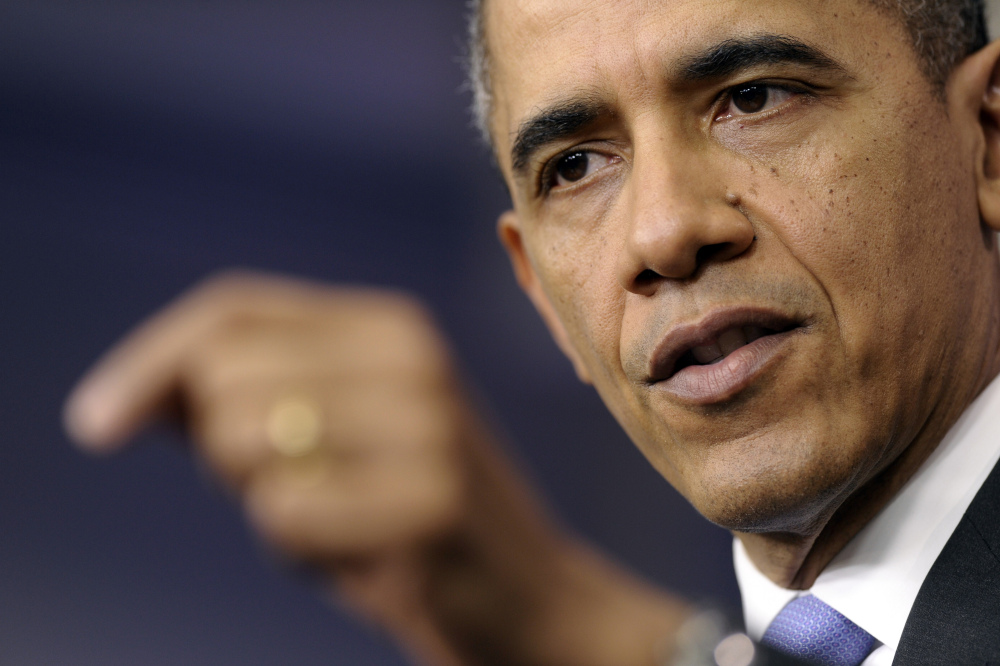WASHINGTON — President Obama signaled Friday that he may halt the National Security Agency’s collection and storage of millions of Americans’ phone records and instead require phone companies to hold the data.
Speaking at a White House news conference near the end of a very difficult year, Obama said that he would have a “pretty definitive statement” on proposed NSA reforms in January, following his family’s annual holiday break in Hawaii.
His remarks suggested that Obama’s views have changed significantly since details of the NSA’s far-reaching surveillance programs were publicly revealed in June. He said he believed his administration has struck the right balance between intelligence gathering and privacy protection but acknowledged that concerns about the potential for abuse may make it necessary to rein in the programs to restore public trust.
“The environment has changed,” Obama said. He said that it “matters more that people right now are concerned,” and added, “Just because we can do something doesn’t mean we necessarily should.”
During the 60-minute news conference, Obama also reiterated his claim of personal responsibility for the disastrous rollout of his health-care law. In addition, he expressed optimism that he could advance his agenda in 2014, beginning with immigration reform.
“I think 2014 needs to be a year of action,” Obama said.
The president said his NSA review, based on the assessments of intelligence officials and other officials inside and outside of the federal government, would determine which programs to maintain or eliminate, both domestically and internationally.
An independent White House panel released a report this week questioning whether the NSA’s sweeping collection of personal data had played any meaningful role in preventing terrorist attacks. A federal judge also ruled that the data collection was probably unconstitutional.
Obama acknowledged that the United States needs to provide “more confidence” to the international community amid widespread outrage over revelations of U.S. spying on many foreign allies.
“What has been more challenging is the fact that we do have a lot of laws and checks and balances and safeguards and audits when it comes to making sure that the NSA and other intelligence communities are not spying on Americans,” Obama said. “We’ve had less legal constraint in terms of what we’re doing internationally.”
He added, “In a virtual world, some of these boundaries don’t matter anymore.”
Obama defended the NSA, saying that he has seen no evidence that the agency “acted inappropriately” with the billions of call records it has assembled in a secret database, a claim that is at odds with compliance reports and other documents leaked by former NSA contractor Edward Snowden.
Obama all but endorsed one of the White House panel’s proposals, which would require phone companies to hold the data that the NSA has been collecting.
“It is possible that some of the same information . . . can be obtained by having private phone companies keep those records longer” and allowing the government to search them under tight guidelines, Obama said.
That prospect has drawn fire from privacy advocates and technology experts, who say it would be as bad as or worse than having the NSA hold the records.
Phone companies also do not want to be the custodians of data sought by law enforcement or civil attorneys.
“Mandatory data retention is a major civil liberties problem and something that other groups would oppose categorically,” said Rainey Reitman, activism director of the Electronic Frontier Foundation.
Currently, phone companies keep call records for periods ranging from six months to 10 years.
“Requiring by law that companies retain call records longer than they do for business reasons subjects those records to risk of theft by hackers and subpoena by state and local law enforcement and by civil litigants,” said Gregory Nojeim, senior counsel for the Center for Democracy and Technology. “Because many entities other than the NSA would gain access, it is a step backwards for privacy.”
During the news conference, Obama sought to grapple with a year of partisan turmoil in Washington and his inability to advance an ambitious second-term domestic policy agenda through Congress.
Initiatives on gun violence and immigration failed or stalled in the face of Republican opposition, and the president was unable to prevent broad spending cuts known as the sequester or a partial shutdown of the federal government.
When asked whether 2013 had been the worst year of his presidency, Obama laughed off the suggestion.
“We have had ups and we have had downs,” Obama said. He added, jokingly, “I think this room has recorded at least 15 near-death experiences.”
Send questions/comments to the editors.



Comments are no longer available on this story